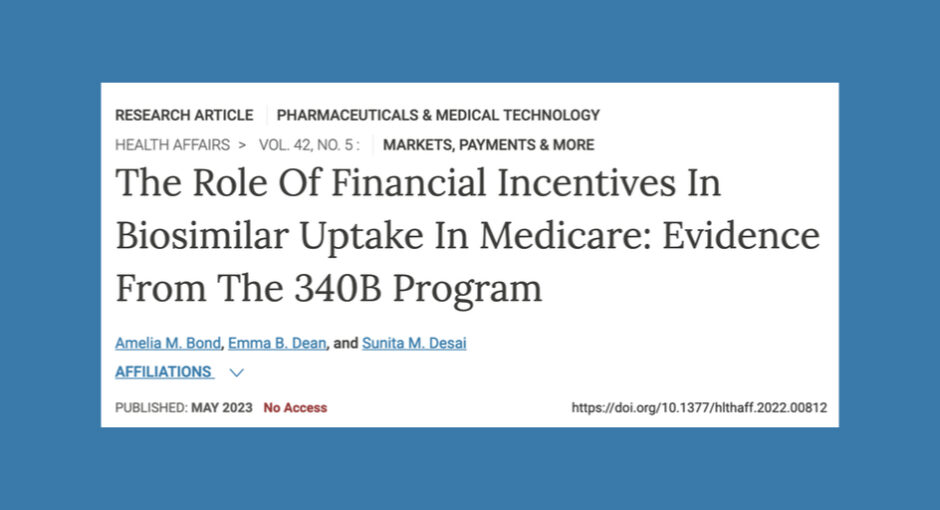Research published online yesterday in the journal Health Affairs suggests that 340B hospitals are less likely than others to use biosimilar drugs, “possibly as a result of financial incentives making reference drugs more profitable than biosimilar medications.”
Groups that represent 340B hospitals are expected to issue rebuttals. Drug manufacturers and others likely will cite it as more evidence why 340B must change.
The study, previously presented at health care and economic research conferences in 2021 and 2022, looked at hospital uptake of generic-like alternatives to Amgen’s bone marrow stimulant Neupogen(filgrastim) and Janssen’s monoclonal antibody Remicade (infliximab).
“Biologic drugs account for a high share of drug spending and are a major driver of drug spending growth,” the study observed. “They accounted for 43 percent of U.S. drug spending in 2019 and 83 percent of drug spending growth from 2015 to 2019.”
“Evidence suggests that [340B] discount percentages are larger for reference products than for biosimilars, which typically are reimbursed by Medicare at lower rates,” the researchers said. “If discount rates are larger for reference products than for biosimilars, then 340B hospitals would have weaker financial incentives to use biosimilars compared with non-340B providers.”
The study focused on hospital outpatient administrations of Neupogen and Remicade and their biosimilars from 2017 to 2019 at 340B disproportionate share and children’s hospitals with a Medicare DSH adjustment within 10 percentage points of the 11.75% threshold for 340B eligibility. Just under 600 hospitals were in the study sample, roughly half 340B-eligible and the others not. Virtually all were urban hospitals. About half were teaching hospitals, with about two thirds of those 340B-eligible.
The researchers found that “340B program eligibility was associated with a 22.9-percentage-point reduction in biosimilar adoption.”
“We found that in hospital outpatient settings, the 340B program was associated with more hospital-based administrations of and revenues from biologic medications overall, as well as reduced use of biosimilars,” the researchers said. “Our findings point to the 340B program as one driver of provider variation in uptake of biosimilars. Given the large proportion of hospitals participating in the 340B program, it could be a factor that has meaningfully reduced overall biosimilar use in the U.S.”
“Our findings add to evidence supporting calls to reform the 340B program to abate incentives to provide more drugs and more high-reimbursement drugs, as well as to better support the goals of the 340B program to benefit low-income patients,” the researchers said. “In particular, reforms to limit eligibility to fewer hospitals with higher DSH percentages could reduce the number of patients affected by the 340B program’s distortion of incentives. Alternatively, reforms that limit the use of discounted drugs to low-income patients could also remove the consequences of the 340B program, substantially discounting drugs for all Medicare enrollees.”
“Policy makers should consider reforms to the 340B program and the Medicare Part B drug reimbursement structure to increase the uptake of biosimilars and other lower-cost clinically equivalent medications,” the researchers said.
The study was conducted by Amelia M. Bond of Cornell University, Emma B. Dean of the University of Miami, and Sunita Desai of New York University and was supported by a grant from the Commonwealth Fund.
Desai was the co-author of a February 2018 study in The New England Journal of Medicine that found that the 340B program incentivizes hospitals to acquire hematology and oncology practices, increase outpatient provision of infused or injected drugs, treat more patients with private insurance that covers drug costs not covered by Medicare Part B, file more Part B drug claims, and treat fewer patients who are dually eligible for Medicare and Medicaid.
Desai and co-author J. Michael Williams of Harvard Medical School and Brigham and Women’s Hospital also said they “found no evidence of hospitals using the surplus monetary resources generated from administering discounted drugs to invest in safety-net providers, provide more inpatient care to low-income patients, or enhance care for low-income groups in ways that would reduce mortality. These results suggest hospital responses that are contrary to the goals of the program.”
The American Hospital Association said the study “fails to draw meaningful, valid conclusions about the program due to constraints and flaws in the methodology used.”


